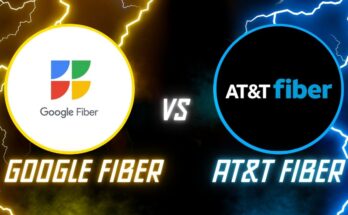Cox and AT&T Home Internet depend on various factors like costs, plans, fiber-optic presence, and download speed. AT&T provides fiber packages at $55 per month for 300 Mbps with speeds up to 5 Gbps in chosen regions. Cox cable Internet packages are available between $50 per month for 100 Mbps and $110 monthly for 1 Gbps. AT&T offers excellent worth for the money at maximum speed tiers as Cox has a more cost-effective entry-level cost. The presence of the quickest fiber packages differs by region, so examine what’s provided in your region. This comprehensive comparison article will delve into various aspects of AT&T vs Cox Internet, including plans and pricing, pros, customer service, and additional considerations.
AT&T vs Cox Plans and Pricing Overview
AT&T vs Cox Internet differentiates by offering different Internet packages involving fiber-optic Internet, DSL Internet, and fixed wireless connections. Fiber packages are especially worthwhile for providing limitless data and quick speed at reasonable costs. AT&T Internet 300 package costs $55 monthly offering a strong 300 Mbps speed that makes it a superb option for maximum families. AT&T fiber packages offer 5000 Mbps speed that delivers versatility for users with multiple necessities.
Cox Communications concentrates on cable Internet with packages between 25 Mbps to Gigabit service. Users miss AT&T fiber upload speed as Cos packages are affordable. It’s significant to register that Cox implements crucial cost increments after a year that impact the complete affordability of their packages.

Starting at @$30.99 PER MONTH
- Provider: AT&T
- Download Speed up to 5000 Mbps

Starting $90 PER MONTH
- Provider: COX
- Download Speed up to 500 Mbps
AT&T vs Cox – Pros and Cons
AT&T Pros
- Various fiber packages serve multiple speed priorities.
- No annual terms offering versatility to consumers.
- No data caps on fiber packages assuring limitless utility.
AT&T Cons
- Restricted access to the quickest packages.
- Unassumed DSL speeds.
Cox Pros
- Excellent consumer care improving user experience.
- Bundle for those looking for paired services.
- No contract offering consumers versatility.
Cox Cons
- Data Caps on all Internet packages.
- Big cost increments after a year.
ATT Plans and Pricing
AT&T Internet plans present a variety of internet packages encompassing fiber-optic, DSL, and fixed wireless connections. The fiber plans offer the most favorable terms, although they are also less readily available. Cox furnishes cable internet across various levels, starting from an economical 25 Mbps plan to a more costly gigabit service. Compare AT&T vs Cox Internet prices and plans given below.
| Plan | Cost | Speed | Type |
|---|---|---|---|
| AT&T Internet 100 | $60/month | 100 Mbps | Fiber |
| AT&T Internet 300 | $55/month | 300 Mbps | Fiber |
| AT&T Internet 500 | $65/month | 500 Mbps | Fiber |
| AT&T 1GIG Internet | $80/month | 1000 Mbps | Fiber |
| AT&T 2 GIG Internet | $150/month | 2000 Mbps | Fiber |
| AT&T 5 GIG Internet | $250/month | 5000 Mbps | Fiber |
| AT&T Fixed Wireless Internet | $30.99 to $50.99/month | 300 to 5000 Mbps | Fixed Wireless |
| AT&T Internet Air | $60 per month ($47 per month when bundled with AT&T Unlimited Wireless Plan) | 40 to 140 Mbps | Fixed Wireless/5G |
AT&T provides different fiber Internet packages featuring up to 5 Gbps speed. It is the quickest speed from any key provider across the United States. The 300 Mbps package costs $55 monthly a strong choice as 5 Gbps speed is a big speed for maximum users. It is specifically for families with different users. The versatility to terminate with early charges is attractive.
Cox vs AT&T offers Fixed Wireless Internet, for those living in remote regions with restricted Internet choices that serve users to encounter connectivity problems.
Know AT&T Internet Air as a cost-effective DSL option. Internet Air evolves as a 5G substitute as AT&T moves out of its service. This package provides bigger speed and lower latency than conventional DSL functioning on AT&T’s cellular network via 5G transmitters. The cost-effective package comes without additional fees or data overage charges, making it an attractive option for a robust 5G broadband connection.
Cox Plans and Pricing
Cox presents a range of cable packages, providing the flexibility to balance cost savings with higher speeds. While none of these options directly match the offerings of AT&T’s fiber plans, like Internet Essential 100, priced $5 lower per month, which is 200Mbps slower than AT&T’s basic fiber plan. It’s worth noting that each Cox plan experiences a significant price increase after the initial year.
However, Cox internet plans stand out for their rapid speed and dependable service. Moreover, it’s often easier to secure a cable plan with Cox compared to obtaining a fiber plan from AT&T. Consequently, for most internet users, Cox remains the swifter choice.
| Plan | Cost | Speeds | Features |
|---|---|---|---|
| Go Fast | $50/month for 24 months. | Up to 100 Mbps | – Website, social media, and email browsing. – No-contract. – Cancellation charges. |
| Go Faster | $70/month for 24 months | 250 Mbps | – Excellent for Online Gaming, Working from Home, and more. – No-contract. – Cancellation charges. |
| Go Even Faster | $90/month for 12 months | 500 Mbps | – Exceptional for 4K video, multi-player gaming, working from home, and more. – No-contract. – Cancellation charges. |
| Go Super Fast | $110/month | 1000 Mbps | – Exceptional for 8K video, multi-player gaming, working from home, and more. – No-contract. – Cancellation charges. |
| Cox Go Beyond Fast | $149.99/month | 2000 Mbps | – Exceptional multiple video conferences. – Multi-player gaming. – Multiple 4K/8K streams. – Virtual Reality and More. – No contract. – Cancellation charges. |
AT&T vs Cox – Deals and Promotions
| AT&T | Cox |
|---|---|
| – Obtain a Gift Card of $150 worth when you register for AT&T Fiber and a qualified wireless package till March 2025. – Obtain a termination charge from your previous Internet provider when you shift. – Obtain free expanded WiFI and Internet protection when you select a 2 Gig or 5 Gig package. – Secure 20% on Internet per month when you combine with AT&T wireless service. | – Secure $15 monthly when you combine Internet with Cox Mobile. – Obtain a free Panoramic WiFi device for 1 year with a package of 100 Mbps or experience for 2 years with a package of 250 Mbps or quicker. |
AT&T vs Cox – Extra Fees
| Providers | Equipment Fee | Installation Fee | Other Fees |
|---|---|---|---|
| AT&T | $10/month | Professional installation for DSL can cost up to $99, or use a self-install kit. | $15/month (Early Termination)$9 (Late payment). |
| Cox | $12/month | Professional installation is priced at $100, or you can choose the free self-install kit. option. | $10/month (Early Termination). |
AT&T vs Cox imposes charges for professional installation, but you have the option to choose a self-installation method to eliminate additional fees from your bill.
Regarding equipment, your provider furnishes everything you need to establish an online connection after signing up, typically for a monthly fee. This equipment includes a modem, a router, and, if you subscribe to TV service, a cable box or DVR. However, you have the choice to purchase your equipment to reduce costs.
The advantage of provided equipment by ATT Fiber vs Cox is its guaranteed compatibility with your service, and if you encounter issues, it falls under your provider’s coverage. AT&T does not levy charges for a router and modem with its fiber plans, while Cox imposes a $12 per month rental fee for its Panoramic WiFi Gateway, a combination of a modem and router.
AT&T vs Cox – Availability
| Alabama | Louisiana |
| Arizona | Michigan |
| Arkansas | Mississippi |
| California | Missouri |
| Florida | Nevada |
| Georgia | North Carolina |
| Illinois | Ohio |
| Indiana | Oklahoma |
| Kansas | South Carolina |
| Kentucky | Tennessee |
| Texas | Wisconsin |
AT&T vs Cox – Internet and TV Bundles
| Plan | Internet Speed | TV Channels | Cost |
|---|---|---|---|
| Cox Go Fast + Contour Starter | 100 Mbps | 75+ | $110 per month |
| Cox Go Even Faster + Contour Preferred | 500 Mbps | 140+ | $199 per month |
| Cox Go Super Fast + Contour TV Starter | 1000 Mbps | 75+ | $171 per month |
| Cox Go Beyond Fast + Contour TV Starter | 2000 Mbps | 250+ | $211 per month |
| DIRECTV Entertainment + AT&T Fiber Internet 300 | 300 Mbps | 75+ | $112.99 per month |
| DIRECTV Choice All-Included Package + AT&T Fiber Internet 300 | 300 Mbps | 105+ | $124.99 per month |
Cox provides bundles with its own cable TV service like Cox Contour TV. Cox is a robust TV service with an excellent channel choice. Affordable bundlings with Cox Contour Stream Player provide you with streaming TV rather than wired cable TV. If you need to combine a Cox Internet package with cable TV, bundle with any of the Cox Internet packages with a Cox TV package offering 75 to 200 channels.
AT&T pairs its Internet plans with DIRECTV so you can enjoy Internet service with 150+ channels. Stream DIRECTV without any satellite dish. You can access conventional satellite TV if no high-speed Internet is available. This way you can choose and compare between AT&T Internet vs Cox.
Data Caps – AT&T vs Cox
| Provider | Data Cap |
|---|---|
| AT&T Fiber | – No data cap on fiber packages. – 1 TB data for up to 75 Mbps. – 350 GB for fixed wireless. |
| Cox | – 1.25 TB |
You can get no data caps with AT&T fiber packages. AT&T’s fixed wireless plan has a little 350 GB data cap. Cox provides its consumers with a 1.25 TB data cap. This happens with maximum users as huge streamers may encounter difficult situations.
Cox vs AT&T – Contracts
| Provider | Contract Length |
|---|---|
| AT&T Fiber | No contracts for AT&T TV or fiber. |
| Cox | 1 year and monthly choice at $10 additional charge. |
If you register for AT&T plans, no annual contracts are provided and you can terminate anytime. Cox provides you alternatives to register for a year contract or funding $10 per month additional. The early cancellation charge for an annual contract is $10 per month.
AT&T vs Cox – Installation
| Provider | Installation Choices |
|---|---|
| AT&T Fiber | – Up to $99 per month. – Free self-installation kit. |
| Cox | – $100 per month. – Free self-installation kit |
Conclusion
Get dynamic Internet services with variable benefits at Cox vs AT&T Internet. AT&T propels in fiber packages that offer ultra-fast speed and versatility whereas Cox looks different for efficient cable service. Before choosing any one of the providers, you must focus on specific necessities of users, location, and priorities that make it significant to measure cost, packages, and extra fees. To learn more about high speed internet packages, call Club HDTV customer service number – +1(855)-352-5313.




